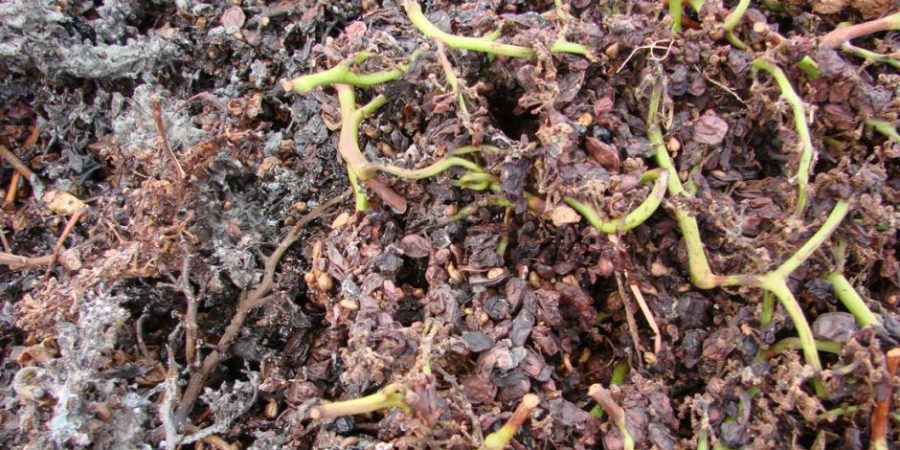This week’s blog post comes to you thanks to a loyal Jockey Club member come expert grape-picker. After getting involved in our hands-on vineyard experience a couple of weeks ago, our friend Janelle got to thinking about the bigger picture when it comes to wine-making…
What happens to all the unwanted parts of the grapes?
This video (from last week’s post) probably got her thinking…
Now, that’s a heck of a lot of stems. And that’s just for one wine, in one winery, in the little old Adelaide Hills.
What about the rest? And all the other waste products like skins and seeds after they’ve done their job?
Well, that is a very good question…
First, some stats
Based on an industry-wide survey conducted by the University of Melbourne back in 2003, it was calculated that wineries create over 300 kg of solid waste for each tonne of fruit crushed. That’s (on average) 30% of the harvest! And in my calculation, that’s A LOT of waste.
According to the report, of the 1,605,846 tonnes (!!) of fruit crushed in the 2001/02 vintage, the following wastes were generated…
- 57,000 tonnes of stalks,
- 218,000 tonnes of grape marc,
- 21,000 tonnes of unfermented juice lees solids,
- 10,000 tonnes of fermented yeast lees solids, and
- a range of other wastes such as bentonite which is left over after the fining process.
Reuse and recycle
A common practice amongst most small wineries is to dispose of this waste on-site. As you can imagine, the waste from vineyards and wineries is very high in nutrients. It is also organic and contains no heavy metals or toxins. This makes it perfect for composting and re-use as mulch in the vineyard. Liquid waste is often treated and used as fertiliser for vines and nearby vegetation.
What a lovely little environmentally friendly life-cycle!
What about the big guys?
That’s all well and good for smaller producers but surely the bigger wineries produce more waste than they know what to do with? Right? Right!
But, luckily for them, there are MANY other uses for winery and vineyard waste products.
And this type of waste is actually pretty valuable. There is a company here in South Australia called Tarac Industries who specialise in turning winery by-products into a range of interesting things. Such as…
- Grape alcohol – used to make vintage port, brandy and other spirits
- Tannin – used to adjust the tannin levels in a wine after fermentation
- Natural tartaric acid – prevents spoilage, balances the wine structure and interacts with the fruit and tannin profile
- Grape juice concentrate – especially important in the production of sparkling wines
- Grape seeds – exported to health-food companies and grape seed oil producers across the globe
- Stock feed – for livestock and aquaculture
- and, of course, compost and mulch – for vineyards and gardens
Wow!
It’s somewhat comforting to know that waste coming out of wine production is being recycled back into the production of other wines! It’s also nice to know that additives such as tannin and tartaric acid are 100% grape derived. That means no nasty synthetics going into our wines.
Hooray!
7 Days A Week!
That’s right… Somerled will open for all your wine, platter and friendly banter needs 7 days a week!
Ironically we’re closed today (for Good Friday) but starting tomorrow (Saturday 20th April) you will never have to be without us again. Open until 7.30pm every night. Join us for a glass (or bottle) of something soon!
Mother’s Day with Souffle
I know you’re all probably too busy relaxing and munching on your Easter treats this long weekend to worry about what happens next, but just a word of warning… Mother’s Day is just around the corner.
Why not treat Mum (or yourself) to a day out with our latest event…
http://blog.somerled.com.au/product/mothers-day-with-souffle/
Or add lunch…
http://blog.somerled.com.au/product/mothers-day-with-souffle-plus-lunch/
Get your tickets now!
